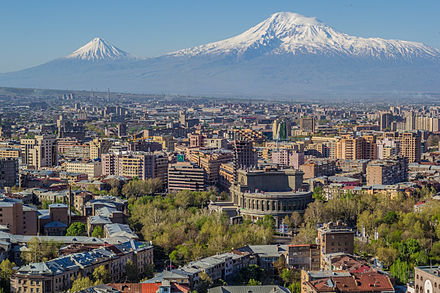On June 20, Armenia’s citizens will be heading to the polls for a second snap parliamentary election in less than three years. While the December 2018 snap election was held in the aftermath of a popular revolution and brought Nikol Pashinyan to power, the forthcoming election is taking place against the backdrop of a disastrous six-week war with Azerbaijan and the continued demands by opposition groups for Pashinyan’s resignation. The triggers of the two snap elections were greatly different in nature, but equally important: The 2018 elections were about the promise of democratic consolidation while the June 2021 elections are about the future security of the country.
The September to November 2020 war between Azerbaijan and Armenia over Nagorno-Karabakh ended with Armenia agreeing to what many observers in the country perceived as a “humiliating capitulation”, resulting in a shift in the power balance between the two neighbouring countries. After the initial shock of defeat, demonstrators started gathering in Yerevan, Armenia’s capital, demanding the resignation of Pashinyan, calling him a “traitor”, and questioning his ability to provide safety and security to Armenia proper. Despite their best efforts, the demonstrators were not able to gather enough critical mass to force Pashinyan to resign.
In March 2021, however, Pashinyan finally buckled under growing political pressure and hinted that snap parliamentary elections could be held before the end of the year. A month later, he resigned and the National Assembly refused to elect a new PM, officially triggering a snap election.
After the date of the snap election was announced, Armenia’s political landscape witnessed a major whirlwind where existing political parties started coalescing to form electoral blocs. Eventually 26 political groups – four electoral blocs and 22 parties – were officially registered to run. The frontrunners among these groups are Pashinyan’s Civil Contract Party and the main opposition Armenia Alliance headed by former President Robert Kocharyan. According to recent opinion polls, Civil Contract and Armenia Alliance are within a margin of error of each other to take the lead.
Many contenders will be taking part in the upcoming snap election for two main reasons. First, the crushing defeat Armenia faced in the war provided an opportunity for various political forces to challenge Pashinyan’s otherwise popular regime. Second, the incumbent administration, which has been in power for less than three years, does not yet have enough control over administrative resources to sway the upcoming election in its favour and make its reelection a foregone conclusion. This second point is especially important because, in almost every election that has taken place in Armenia in the past 25 years, incumbents have managed to utilise administrative resources to guarantee their and their allies’ victory, thus discouraging smaller parties from running.
With most of the parties having already published their electoral platforms, it is clear that the main issues in the June snap election are national security and the future of Armenia’s negotiations with Azerbaijan, especially the negotiations on the border demarcation between the two countries. In recent months, as border tensions between Armenia and Azerbaijan increased, the issue of border security started to dominate the political and public discourse in Armenia.
As national security became a leading concern for many Armenians, support for Kocharyan and his alliance increased in public opinion polls. This is largely due to the former president projecting himself as a more seasoned statesman and juxtaposing that with Pashinyan’s lack of experience both in foreign policy and national security domains. The fact that Kocharyan has always presented himself as a “wartime leader” – he was the leader of the self-declared republic of Nagorno-Karabakh in the 1990s and has been highlighting those credentials in his campaign – has made him and his alliance an obvious choice for most undecided voters and for those who view the country’s national security as a priority.
That being said, it should be noted that Kocharyan is carrying a lot of baggage from his time as Armenia’s president (1998-2008). He is, for example, conveniently omitting from his election campaign the fact that during his tenure as president he did not take initiatives to solve the Nagorno-Karabakh conflict peacefully even though he had an opportunity to do so.
Moreover, and perhaps most importantly, many in Armenia still hold Kocharyan responsible for the police using deadly force to disperse demonstrators in the aftermath of the 2008 presidential election. It was during these protests that Pashinyan himself was active as a member of the opposition and was briefly imprisoned. When he became prime minister, Pashinyan ordered an investigation into Kocharyan’s responsibility for the March 2008 violence that resulted in the deaths of two police officers and eight protesters.
Finally, a major question in the minds of many people is the role, if any, Russia would play in the upcoming elections. All indicators show that Moscow is in no rush to support either Pashinyan or Kocharyan. Russia, having established boots on the ground in Nagorno-Karabakh in the form of Russian peacekeepers, has become the de facto security guarantor of not only that region but also of Armenia itself. Moreover, Russia’s hold over Armenia’s embattled PM, along with the close ties Kocharyan has with Moscow, make the election results of no consequence for Russia’s strategic interest in Armenia.
The above factors raise the possibility that the upcoming elections will be more about the personal rivalry between Pashinyan and Kocharyan than determining the path Armenia will follow in the post-war era.
Additionally, many citizens are starting to believe that on June 20 they will be making a choice between ensuring national security and protecting democracy. Indeed, some observers argue that the difference between the two major political forces is that one side is democratic (Pashinyan) and the other, anti-democratic (Kocharyan).
However, the reality is that regardless of who wins these elections, democracy will be the biggest loser and democratic reforms will be curtailed in Armenia. Continuing to argue that democracy and security are incompatible and are mutually exclusive may lead Armenia to lose on both fronts.
The views expressed in this article are the author’s own and do not necessarily reflect Al Jazeera’s editorial stance.














